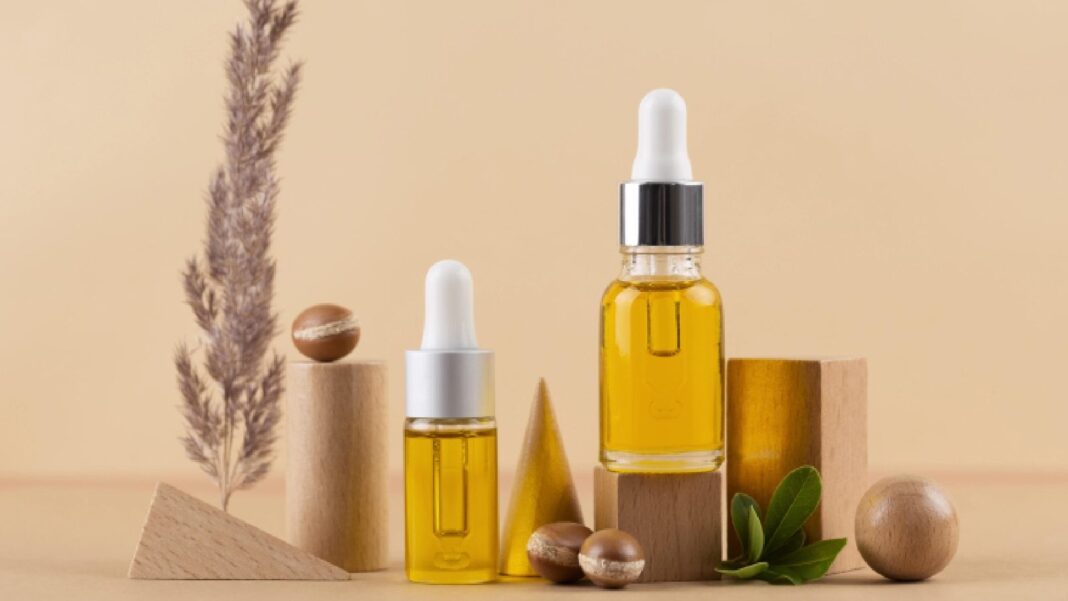Carrier oils can be used alone or mixed with essential oils to improve your skin health. Let us tell you about the best carrier oils and how to use them.
Carrier oils are plant oils that are often used with essential oils, which are highly concentrated in nature. Carrier oils are mixed with essential oils so that you don’t experience skin irritation, which can happen if you directly use essential oils. You can also pick up a bottle of carrier oil and use it on your face. Wondering which carrier oil is best for your skin? Let us reveal a list of the best carrier oils that can be used by women with different skin types.
What are carrier oils?
Carrier oils are vegetable oils derived from plants’ fatty portions such as nuts, seeds, or kernels. They are used to dilute essential oils and other concentrated plant extracts before applying them to the skin. Carrier oils mostly help carry essential oils into the skin and are typically used in aromatherapy, massage, and skincare, says aesthetic, plastic and reconstructive surgeon Dr Shraddha Deshpande.

Best carrier oils for skin
There are many oils that can be used in skincare routine. Here are some of them:
1. Jojoba oil
Jojoba oil mimics skin’s natural sebum, and is non-comedogenic, deeply moisturising, and anti-inflammatory, says the expert. Due to its anti-inflammatory agents, and healing properties, jojoba oil can help to prevent acne, according to a 2012 study published in Research in Complementary Medicine.
2. Sweet almond oil
Rich in vitamins A, E, and fatty acids, sweet almond oil can soothe and nourish skin while reducing dryness and irritation. It may protect your skin from sun damage, as vitamin E can absorb UV rays, according to a 2018 research published in Scientific Reports.
3. Coconut oil
Coconut oil is popular because it can deeply moisturise your skin. It also has antibacterial and antifungal properties, but it should not be used by those with acne-prone skin, as it can clog pores, says Dr Deshpande.
4. Argan oil
High in vitamin E and essential fatty acids, argan oil is non-greasy, and gets absorbed in the skin quickly. It may help with skin elasticity, make it slower for skin to sag or wrinkle, says the expert.
5. Grapeseed oil
This is another light oil that can get easily absorbed in your skin. Grapeseed oil is high in antioxidants, and has anti-inflammatory as well as non-comedogenic properties.
6. Olive oil
Rich in antioxidants and vitamins A, D, E, and K, olive oil is not only good for cooking, but also great for skin. It can deeply moisturise, soothe and repair dry, and damaged skin.

7. Avocado oil
It contains vitamins A, D, and E, and is highly moisturising. It may promote collagen production, and so itis beneficial for dry, ageing, and sensitive skin, says the expert.
Select Topics of your interest and let us customize your feed.
How to select a carrier oil for different skin types?
While picking the best carrier oil for your skin, keep these points in mind:
- Dry skin: Opt for richer oils like avocado, olive, or sweet almond oil, which provide deep hydration and nourishment.
- Oily skin: Choose lighter oils such as grapeseed or jojoba oil, which balance oil production without clogging pores.
- Sensitive skin: Look for gentle, soothing oils like sweet almond or jojoba oil, which are less likely to cause irritation.
- Combination skin: Argan oil can be a good choice as it can balance and hydrate without being too heavy or too light.
- Ageing skin: Go for argan or avocado oil, as they promote elasticity and reduce the appearance of fine lines and wrinkles.
How to use carrier oils with essential oils?
To use carrier oil with essential oils, follow these steps:
- Mix essential oils with a carrier oil to dilute them. The standard dilution ratio is about 2 to 3 drops of essential oil per tablespoon of carrier oil for adults.
- Combine the essential and carrier oils in a clean glass bottle or bowl, and mix thoroughly.
- Apply the mixture to skin as needed, using gentle, circular motions.
Most carrier oils can be mixed with any type of essential oil, but it is important to consider the properties of both the carrier and essential oils, says the expert. For instance, a light carrier oil like grape-seed might be preferred for a facial application, while a richer oil like coconut might be better for body applications.
Carrier oils can be used without essential oils, as they are beneficial on their own. They can moisturise, nourish, and protect your skin.








